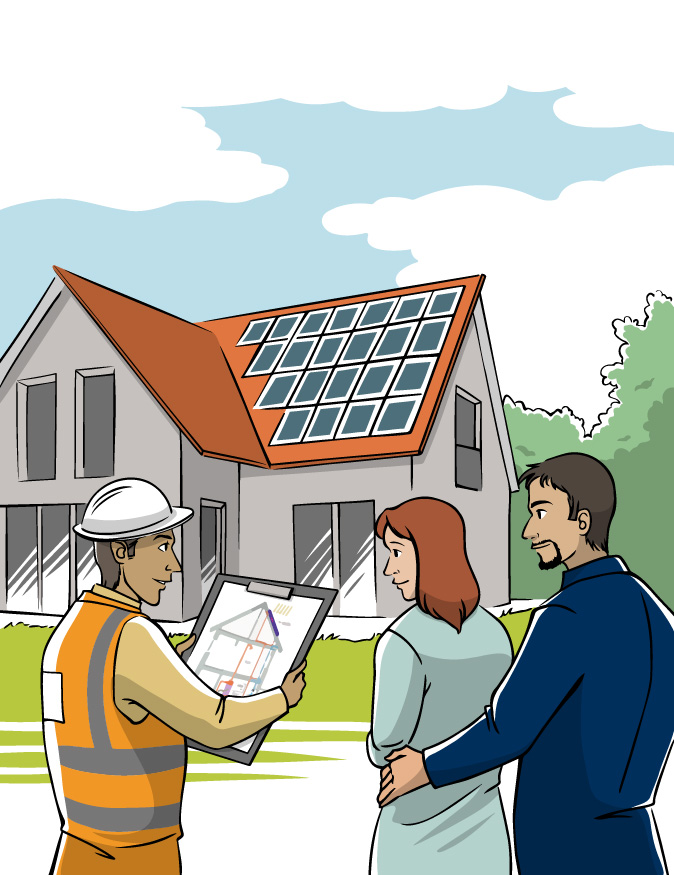
Download IQ Good Practice as PDF
including hands-on report and interview with Haiko Hörnicke, contact partner and management of project "Mission Zukunft – Modul Umwelthandwerk" in the Hamburg Network IQ
Energy transition and labour market integration
To counter the skilled workers shortage "Mission Zukunft" trains academically qualified migrants in environmental occupations.
Starting point/challenge
Solar thermal energy, photovoltaics and thermal storage are all some of the crucial technologies needed to ensure a successful shift to sustainable energy in Germany. In these and other environmental fields, however, there is a lack of skilled workers, the demand for which will rise to 250,000 by 2030. This high demand for people with environmental qualifications cannot be covered in the short and medium term by training and study. At the same time, many migrants with environmental technology training are working in temporary jobs well below their qualification level.
Implementation of the Environmental Trade bridging measure
In order to counter the shortage of skilled workers, the IQ subproject "Mission Zukunft – Environmental Trades module" provided by the Centre for Energy, Water and Energy Technology (Chamber of Skilled Crafts Hamburg, HWK) prepares academically qualified migrants for work in environmental technology. Building upon their previous experience in technology, the participants are prepared for occupations in environmental trades – ranging from specialist qualifications in building technology, plant engineering, electronics or cold and climate engineering to managing a natural gas plant.
The five-month bridging measure is comprised of four pillars: technical German, practical workshop lessons, excursions to places relevant to environmental technology, e.g. energy and water supply, wind turbine farms, solar thermal energy plants, or environmental firms of the skilled crafts, and coaching sessions. In addition to teaching specialist vocabulary in the field of energy technology, relevant work situations are simulated in the HWK workshops and the participants are supported in their learning and the application process, and put in contact with environmental technology firms.
By reinforcing individual management skills in group and project work the participants are already prepared during the training for future situations in the real world of work. The full-time course has 480 learning units. Individual completion prospects are developed to ensure that labour market integration is successful. With the long-standing knowledge about training and labour market in Hamburg a "bridge" is made to an individual plan for the participants.
Conclusion
So far, all 80 participants of the four-module bridging measure have been placed in a qualified job or in higher qualified degrees or training. In addition the project was awarded the Harburg Sustainability Prize in March 2021. The combination of education, ecology, economic aspects and integration was particularly emphasised. Due to the pandemic, the curriculum, teaching methods and the coaching of the bridging measure was changed to a potential blended learning approach so that the lessons and excursions can be carried out virtually.
Addressees for transfer:
Education and training service providers, companies
Bridging measure Environmental Trades
The bridging measure provides solutions for the two challenges facing society; energy transition and the labour market integration of migrants trained in environmental technology. Environmental training and tailored placement via individual integration plans create a strong bridge into the labour market. Seven learning areas cover language promotion, the labour market, foundations of environmental technology, pollution prevention, and decentralised energy supply. Participants are supported during the five-month training and then placed in further specialist training courses and/or in environmental technology jobs.
Project:
Mission Zukunft (Mission Future): Refresher and second-chance training in the Hamburg skilled crafts – Environmental Trades module
Provider:
Centre for Energy, Water and Environmental Technology (ZEWU) of the Hamburg Chamber of Skilled Crafts.
Project contact partner:
Haiko Hörnicke, Zum Handwerkszentrum 1, 21079 Hamburg, Tel.: +49 40 35905776, Email: haiko.hoernicke(at)elbcampus.de
Provision:
More information is available at https://hamburg.netzwerk-iq.de/projekte/missionzukunft/?missionzukunft
